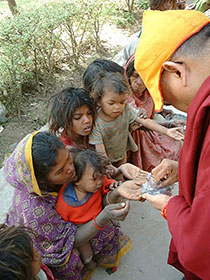- Home
- FPMT Homepage
Foundation for the Preservation of the Mahayana Tradition
The FPMT is an organization devoted to preserving and spreading Mahayana Buddhism worldwide by creating opportunities to listen, reflect, meditate, practice and actualize the unmistaken teachings of the Buddha and based on that experience spreading the Dharma to sentient beings. We provide integrated education through which people’s minds and hearts can be transformed into their highest potential for the benefit of others, inspired by an attitude of universal responsibility and service. We are committed to creating harmonious environments and helping all beings develop their full potential of infinite wisdom and compassion. Our organization is based on the Buddhist tradition of Lama Tsongkhapa of Tibet as taught to us by our founders Lama Thubten Yeshe and Lama Thubten Zopa Rinpoche.
- Willkommen
Die Stiftung zur Erhaltung der Mahayana Tradition (FPMT) ist eine Organisation, die sich weltweit für die Erhaltung und Verbreitung des Mahayana-Buddhismus einsetzt, indem sie Möglichkeiten schafft, den makellosen Lehren des Buddha zuzuhören, über sie zur reflektieren und zu meditieren und auf der Grundlage dieser Erfahrung das Dharma unter den Lebewesen zu verbreiten.
Wir bieten integrierte Schulungswege an, durch denen der Geist und das Herz der Menschen in ihr höchstes Potential verwandelt werden zum Wohl der anderen – inspiriert durch eine Haltung der universellen Verantwortung und dem Wunsch zu dienen. Wir haben uns verpflichtet, harmonische Umgebungen zu schaffen und allen Wesen zu helfen, ihr volles Potenzial unendlicher Weisheit und grenzenlosen Mitgefühls zu verwirklichen.
Unsere Organisation basiert auf der buddhistischen Tradition von Lama Tsongkhapa von Tibet, so wie sie uns von unseren Gründern Lama Thubten Yeshe und Lama Thubten Zopa Rinpoche gelehrt wird.
- Bienvenidos
La Fundación para la preservación de la tradición Mahayana (FPMT) es una organización que se dedica a preservar y difundir el budismo Mahayana en todo el mundo, creando oportunidades para escuchar, reflexionar, meditar, practicar y actualizar las enseñanzas inconfundibles de Buda y en base a esa experiencia difundir el Dharma a los seres.
Proporcionamos una educación integrada a través de la cual las mentes y los corazones de las personas se pueden transformar en su mayor potencial para el beneficio de los demás, inspirados por una actitud de responsabilidad y servicio universales. Estamos comprometidos a crear ambientes armoniosos y ayudar a todos los seres a desarrollar todo su potencial de infinita sabiduría y compasión.
Nuestra organización se basa en la tradición budista de Lama Tsongkhapa del Tíbet como nos lo enseñaron nuestros fundadores Lama Thubten Yeshe y Lama Zopa Rinpoche.
A continuación puede ver una lista de los centros y sus páginas web en su lengua preferida.
- Bienvenue
L’organisation de la FPMT a pour vocation la préservation et la diffusion du bouddhisme du mahayana dans le monde entier. Elle offre l’opportunité d’écouter, de réfléchir, de méditer, de pratiquer et de réaliser les enseignements excellents du Bouddha, pour ensuite transmettre le Dharma à tous les êtres. Nous proposons une formation intégrée grâce à laquelle le cœur et l’esprit de chacun peuvent accomplir leur potentiel le plus élevé pour le bien d’autrui, inspirés par le sens du service et une responsabilité universelle. Nous nous engageons à créer un environnement harmonieux et à aider tous les êtres à épanouir leur potentiel illimité de compassion et de sagesse. Notre organisation s’appuie sur la tradition guéloukpa de Lama Tsongkhapa du Tibet, telle qu’elle a été enseignée par nos fondateurs Lama Thoubtèn Yéshé et Lama Zopa Rinpoché.
Visitez le site de notre Editions Mahayana pour les traductions, conseils et nouvelles du Bureau international en français.
Voici une liste de centres et de leurs sites dans votre langue préférée
- Benvenuto
L’FPMT è un organizzazione il cui scopo è preservare e diffondere il Buddhismo Mahayana nel mondo, creando occasioni di ascolto, riflessione, meditazione e pratica dei perfetti insegnamenti del Buddha, al fine di attualizzare e diffondere il Dharma fra tutti gli esseri senzienti.
Offriamo un’educazione integrata, che può trasformare la mente e i cuori delle persone nel loro massimo potenziale, per il beneficio di tutti gli esseri, ispirati da un’attitudine di responsabilità universale e di servizio.
Il nostro obiettivo è quello di creare contesti armoniosi e aiutare tutti gli esseri a sviluppare in modo completo le proprie potenzialità di infinita saggezza e compassione.
La nostra organizzazione si basa sulla tradizione buddhista di Lama Tsongkhapa del Tibet, così come ci è stata insegnata dai nostri fondatori Lama Thubten Yeshe e Lama Zopa Rinpoche.
Di seguito potete trovare un elenco dei centri e dei loro siti nella lingua da voi prescelta.
- 欢迎 / 歡迎
简体中文
“护持大乘法脉基金会”( 英文简称:FPMT。全名:Foundation for the Preservation of the Mahayana Tradition) 是一个致力于护持和弘扬大乘佛法的国际佛教组织。我们提供听闻,思维,禅修,修行和实证佛陀无误教法的机会,以便让一切众生都能够享受佛法的指引和滋润。
我们全力创造和谐融洽的环境, 为人们提供解行并重的完整佛法教育,以便启发内在的环宇悲心及责任心,并开发内心所蕴藏的巨大潜能 — 无限的智慧与悲心 — 以便利益和服务一切有情。
FPMT的创办人是图腾耶喜喇嘛和喇嘛梭巴仁波切。我们所修习的是由两位上师所教导的,西藏喀巴大师的佛法传承。
繁體中文
護持大乘法脈基金會”( 英文簡稱:FPMT。全名:Found
ation for the Preservation of the Mahayana Tradition ) 是一個致力於護持和弘揚大乘佛法的國際佛教組織。我們提供聽聞, 思維,禪修,修行和實證佛陀無誤教法的機會,以便讓一切眾生都能 夠享受佛法的指引和滋潤。 我們全力創造和諧融洽的環境,
為人們提供解行並重的完整佛法教育,以便啟發內在的環宇悲心及責 任心,並開發內心所蘊藏的巨大潛能 — 無限的智慧與悲心 – – 以便利益和服務一切有情。 FPMT的創辦人是圖騰耶喜喇嘛和喇嘛梭巴仁波切。
我們所修習的是由兩位上師所教導的,西藏喀巴大師的佛法傳承。 察看道场信息:
- FPMT Homepage
- News/Media
-
- Study & Practice
-
-
- About FPMT Education Services
- Latest News
- Programs
- New to Buddhism?
- Buddhist Mind Science: Activating Your Potential
- Heart Advice for Death and Dying
- Discovering Buddhism
- Living in the Path
- Exploring Buddhism
- FPMT Basic Program
- FPMT Masters Program
- FPMT In-Depth Meditation Training
- Maitripa College
- Lotsawa Rinchen Zangpo Translator Program
- Universal Education for Compassion & Wisdom
- Online Learning Center
-
- Prayers & Practice Materials
- Overview of Prayers & Practices
- Full Catalogue of Prayers & Practice Materials
- Explore Popular Topics
- Benefiting Animals
- Chenrezig Resources
- Death & Dying Resources
- Lama Chopa (Guru Puja)
- Lama Zopa Rinpoche: Compendium of Precious Instructions
- Lama Zopa Rinpoche: Life Practice Advice
- Lama Zopa Rinpoche Practice Series
- Lamrim Resources
- Mantras
- Prayer Book Updates
- Purification Practices
- Sutras
- Thought Transformation (Lojong)
- Audio Materials
- Dharma Dates - Tibetan Calendar
- Translation Services
- Publishing Services
- Ways to Offer Support
- Prayers & Practice Materials
-
- Teachings and Advice
- Find Teachings and Advice
- Lama Zopa Rinpoche Advice Page
- Lama Zopa Rinpoche: Compendium of Precious Instructions
- Lama Zopa Rinpoche Video Teachings
- ༧སྐྱབས་རྗེ་བཟོད་པ་རིན་པོ་ཆེ་མཆོག་ནས་སྩལ་བའི་བཀའ་སློབ་བརྙན་འཕྲིན།
- Podcasts
- Lama Yeshe Wisdom Archive
- Buddhism FAQ
- Dharma for Young People
- Resources on Holy Objects
- Teachings and Advice
-
-
*If a menu item has a submenu clicking once will expand the menu clicking twice will open the page.
-
-
- Centers
-
- Teachers
-
- Projects
-
-
-
-
*If a menu item has a submenu clicking once will expand the menu clicking twice will open the page.
-
-
- FPMT
-
-
-
-
-
Buddhism is not saying that objects have no beauty whatsoever. They do have beauty. The craving mind, however, projects onto an object something that is beyond the relative level, which has nothing to do with that object. That mind is hallucinating, deluded and holding the wrong entity.
Lama Thubten Yeshe
-
-
-
- Shop
-
-
-
The Foundation Store is FPMT’s online shop and features a vast selection of Buddhist study and practice materials written or recommended by our lineage gurus. These items include homestudy programs, prayers and practices in PDF or eBook format, materials for children, and other resources to support practitioners.
Items displayed in the shop are made available for Dharma practice and educational purposes, and never for the purpose of profiting from their sale. Please read FPMT Foundation Store Policy Regarding Dharma Items for more information.
-
-
Lama Zopa Rinpoche News and Advice
26
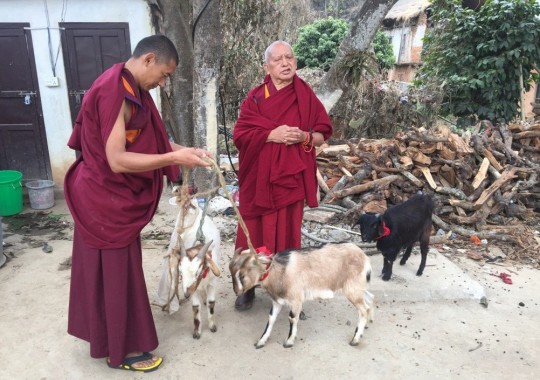
Lama Zopa Rinpoche and attendant Ven. Sangpo blessing newly rescued goats, Maratika, India, February 2016. Photo by Ven. Roger Kunsang.
On February 22, Ven. Roger Kunsang shared on Twitter this photo of Lama Zopa Rinpoche “blessing goats after saving their lives” in Maratika, Nepal, site of the famed Maratika Caves associated with Padmasambhava and long life.
Rinpoche regularly preforms animal liberations, saving animals in threat of being killed and exposing them to Dharma to benefit their future lives.
Ven. Roger Kunsang, Lama Zopa Rinpoche’s assistant and CEO of FPMT Inc., shares Lama Zopa Rinpoche’s recent pith sayings on Ven. Roger’s Twitter page. (You can also read them on Ven. Roger’s Facebook page.)
More information, photos and updates about FPMT spiritual director Lama Zopa Rinpoche can be found on Rinpoche’s webpage. If you’d like to receive news of Lama Zopa Rinpoche via email, sign up to receive FPMT News. Benefiting animals directly is one of Lama Zopa Rinpoche’s Vast Visions for the FPMT organization.
- Tagged: animal liberation, animals, lama zopa rinpoche, maratika cave
- 0
24
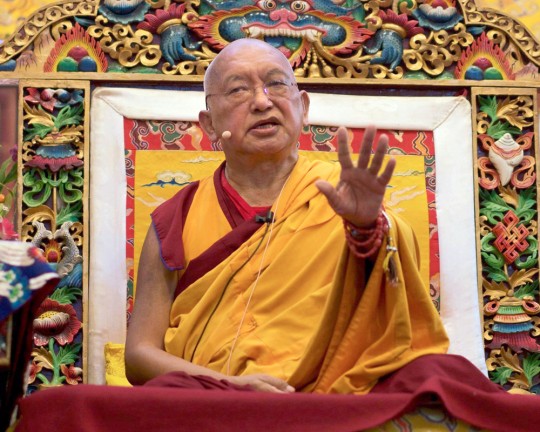
Lama Zopa Rinpoche teaching at Kopan Monastery, Nepal, November 2015. Photo by Bill Kane.
Rinpoche Available Now (RAN), FPMT’s initiative to make Lama Zopa Rinpoche’s most current teachings directly available to all students, has just released “Teachings from the Kopan November Course 2015,” with over 18 hours of video recorded at the famous Kopan November Course in Nepal, a one-month lam-rim course established by FPMT founder Lama Yeshe and current spiritual director Lama Zopa Rinpoche in 1971.
For those unable to watch video, RAN also makes available MP3 audio recordings of the teachings and helpful transcripts to make listening easier.
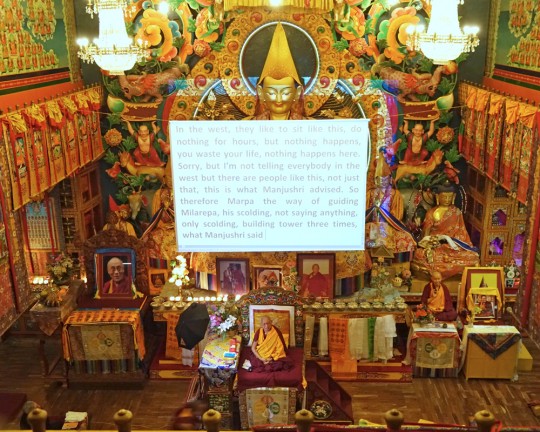
Lama Zopa Rinpoche teaching at Kopan Monastery during the November Course, Nepal, November 2015. Photo by Ven. Roger Kunsang.
Lama Zopa Rinpoche is the spiritual director of the Foundation for the Preservation of Mahayana Tradition (FPMT), a Tibetan Buddhist organization dedicated to the transmission of the Mahayana Buddhist tradition and values worldwide through teaching, meditation and community service.
- Tagged: kopan course, rinpoche available now
- 0
18
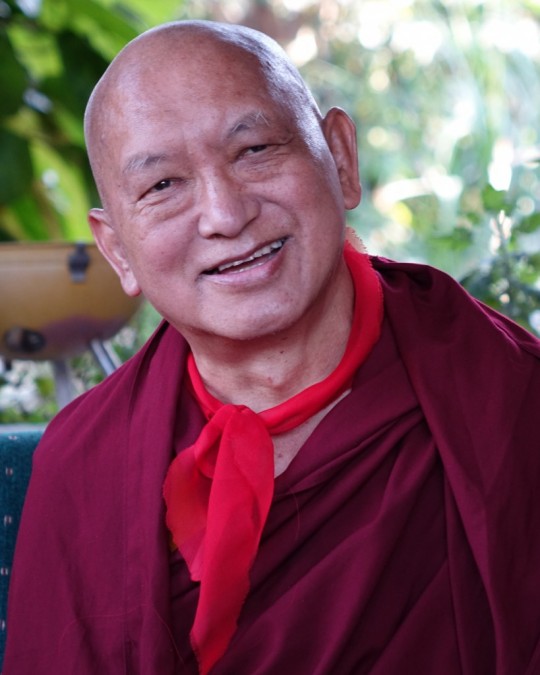
Lama Zopa Rinpoche, Sera Monastery, India, December 2015. Photo by Ven. Roger Kunsang.
FPMT International Office has just published the FPMT Annual Review 2015: Serving the World with a Bodhichitta Attitude as a PDF and as an ezine. Please enjoy Lama Zopa Rinpoche’s letter to FPMT students and supporters taken from this year’s review:
My most dear, most kind, most precious wish-fulfilling ones,
From Lama Tsongkhapa’s “Three Principal Aspects of the Path”:
Even if renunciation has been developed,
If it is not possessed by the mind of enlightenment
It does not become the cause of the perfect bliss of unsurpassed enlightenment.
Therefore the wise generate the supreme mind of enlightenment.
Swept away by the current of the four powerful rivers,
Tied by the tight bonds of karma, so hard to undo,
Caught in the iron net of self-grasping,
Completely enveloped by the total darkness of ignorance,
Endlessly reborn in cyclic existence,
Ceaselessly tormented by the three sufferings –
Thinking that all mothers are in such a condition,
Generate the supreme mind of enlightenment.
First of all, we have all experienced this numberless times. Numberless times we have suffered like this, from beginningless time and will continue to unless one realizes the true suffering, the true cause of suffering, the true cessation of suffering and the true path. If one doesn’t get to actualize the wisdom directly perceiving emptiness, then one will have to experience these sufferings of samsara numberless times and endlessly. So that means being in the ocean of suffering of the six realms. Already we have experienced it numberless times from beginningless lives, and we will have to experience this numberless times without end.
This is so terrifying, most terrifying, most terrifying! To have to be reborn in samsara again, even one more time, it is most terrifying. To be in samsara even for one more day, even one hour, even one millisecond, it is most horrible, most terrifying, if you realize that samsara is only in the nature of suffering and that being in samsara is like being in the midst of molten iron – the very hot, red, iron fire.
We have been hallucinating in samsara, looking at it as pleasurable. The suffering we experience now in samsara is nothing compared to the suffering of numberless hell beings, numberless hungry ghosts, numberless animals, numberless human beings, numberless suras, numberless asuras and numberless intermediate state beings, not only what they are suffering right now but also what they have suffered numberless times from beginningless rebirths.
Even if renunciation has been developed,
If it is not possessed by the mind of enlightenment
It does not become the cause of the perfect bliss of unsurpassed enlightenment.
Therefore the wise generate the supreme mind of enlightenment.
Swept away by the current of the four powerful rivers,
Tied by the tight bonds of karma, so hard to undo,
Caught in the iron net of self-grasping,
Completely enveloped by the total darkness of ignorance,
Similarly sentient beings have experienced this suffering numberless times, the oceans of suffering of the six realms. They haven’t received a perfect human rebirth and haven’t met a perfectly qualified Mahayana guru. Some have, but their number is nothing compared to numberless sentient beings who haven’t received a perfect human rebirth, met the Buddhadharma and met a perfectly qualified Mahayana guru who reveals the unmistaken path. So like this, they will have to suffer again in the ocean of suffering of the six realms, again and again, numberless times, endlessly in samsara.
It is said by the great yogi Heruka Kyabje Pabongka Dechen Nyingpo in “Calling the Guru from Afar”:
Thinking of the plight of my pitiful old mothers, pervasive as space,
Fallen amidst the fearful ocean of samsara and tormented there – reminds me of you, Lama.
Therefore, Lama, please bless me to generate in my mental continuum
Effortless experience of the profound three principles of the path and the two stages.
Here you can understand what to do, what is the best way to help sentient beings, who are numberless, even to help just one sentient being; so this is the best thing. Here the FPMT organization’s main effort is to create the causes for sentient beings to have realizations of the gradual path to enlightenment and to actualize the gradual path to enlightenment, the gradual method and the gradual wisdom and to achieve dharmakaya and rupakaya, for numberless sentient beings, for every maggot, for every tick, for every mosquito and for every single slug. So that comes from practice, and to practice, first you have to learn the Buddhadharma. So for those who can, then you learn the most extensive philosophy, sutra and tantra, lam-rim and then tantric subjects of your own deity and then the essence of what the guru has taught from the holy mouth.
So like the Kadampa Geshes teach according to the different levels of intelligence, the different capacities, so there are three ways of studying. Similarly we offer that, different levels according to different levels of intelligence and capacity, in order to achieve enlightenment for sentient beings, to be able to work perfectly without the slightest mistake for sentient beings. This is why we offer the Masters Program, the Basic Program, Discovering Buddhism, Buddhism in a Nutshell, Living in the Path and so on, this is besides Universal Education for Compassion and Wisdom. Then also we offer social services, such as hospices and many other services. Here it is not only to help the body, but mainly to help the mind. Then in all the centers since they have started, there have been lam-rim teachings continually, offering the essence of the path to enlightenment.
The whole point of FPMT is to bring sentient beings to full enlightenment, to the peerless happiness – the total cessation of all the obscurations and completion of all the realizations. So this is what FPMT has been trying to do, and this is the function of FPMT International Office, to help in that, and also the function of all the centers, projects and services, to be able to benefit in this way to the numberless sentient beings.
When a person has cancer, diabetes or leprosy, but then the person’s nose is crooked, so they try to fix it with plastic surgery, but that doesn’t help cure the cancer, diabetes or leprosy. Or they try to make the wrinkles on their face disappear by spending lots of money, but this doesn’t do anything for the life threatening diseases. People spend so much money and time on something really unimportant, such small things, and have no idea at all, no knowledge at all about the suffering of death, sickness and old age. They don’t know where this suffering comes from, which is karma and delusions, nothing is done for that, nothing is known about that. The root of samsara is the ignorance holding the I as truly existent, as real from its own side, while it is not, while it is totally empty from its own side, from beginningless time. Even having tantra realizations and bodhichitta realizations is not enough, but it is only with wisdom directly realizing emptiness that can directly eliminate the root of samsara – ignorance.
Similarly you don’t have a rhinoceros horn growing from your head or a white-faced monkey’s long tail growing behind you.
So the purpose of the FPMT organization’s existence, it is NOT like that.
Thank you very, very, very much, from the bottom of my heart numberless thanks, by joining my two palms together – numberless thanks and I pray for the success of all the students, all the benefactors, all the volunteers, all the staffs, everybody. Thank you to all the directors of the centers and to every student. We are all here to liberate the numberless sentient beings, our pitiful mother sentient beings, to free them from the oceans of samsaric sufferings and to bring them to peerless happiness – buddhahood: the total cessation of all the obscurations and completion of all the realizations.
With much love and prayers,
Lama Zopa

Lama Zopa Rinpoche wrapped himself in a blanket to dictate his letter for the 2015 FPMT Annual Review and playfully posed for a few photos. “It was very cold,” explained Ven. Holly, who was scribe for the letter, which was composed during Rinpoche’s stay at Tso Pema, India, in January 2016.
Learn more about FPMT International Office and find past years’ Annual Reviews at https://fpmt.org/fpmt/international-office/.
Lama Zopa Rinpoche is the spiritual director of the Foundation for the Preservation of Mahayana Tradition (FPMT), a Tibetan Buddhist organization dedicated to the transmission of the Mahayana Buddhist tradition and values worldwide through teaching, meditation and community service.
- Tagged: annual review, annual review 2015, lama zopa rinpoche
- 0
17
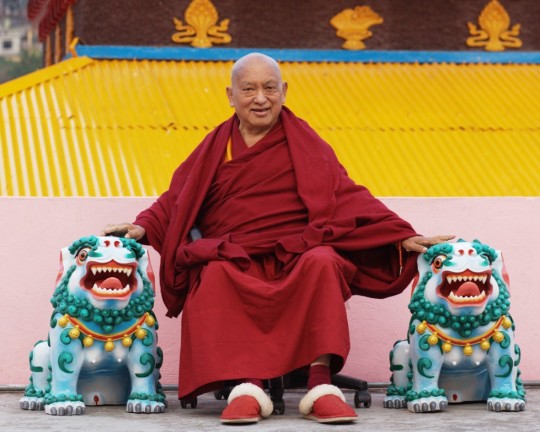
Lama Zopa Rinpoche in Tso Pema, India, February 2016. Photo by Ven. Lobsang Sherab.
Lama Zopa Rinpoche recorded a 20-minute video Losar greeting for the students and supporters of the FPMT organization during his visit to Tso Pema (Rewalsar) in the Indian state of Himachal Pradesh, where Rinpoche stayed for a few weeks in January and February.
“My dear students and all my dear brothers, sisters, fathers, mothers – everybody – thank you very much,” Rinpoche says in the video message. “For the Monkey Year, for this new year, I’m offering from my heart greetings and a billion, zillion, trillion, skies of offerings to everybody. Please, everybody, enjoy bliss – meaningful happiness – in the new year. …”
Watch “Lama Zopa Rinpoche’s Message, Losar 2016” on YouTube:
https://youtu.be/riwytpShUlY
In the video, Rinpoche sits between two snow lion statues on the roof of the building where he completed some personal retreat. Rinpoche purchased the statues from a Tibetan artist’s shop in Tso Pema and is offering them to Tushita Meditation Centre in McLeod Ganj, which is about 100 miles (160 kilometers) to the west and north by car. “I thought I’d send the snow lions to Tushita on my behalf and they can lead meditation and talk about the mind to Westerns and Indians,” Rinpoche said jokingly about the statues.
During his trip to Tso Pema, Rinpoche also visited the sacred sites there associated with Padmasambhava as well as received rare oral transmissions on monastic discipline.
Lama Zopa Rinpoche is the spiritual director of the Foundation for the Preservation of Mahayana Tradition (FPMT), a Tibetan Buddhist organization dedicated to the transmission of the Mahayana Buddhist tradition and values worldwide through teaching, meditation and community service.
15
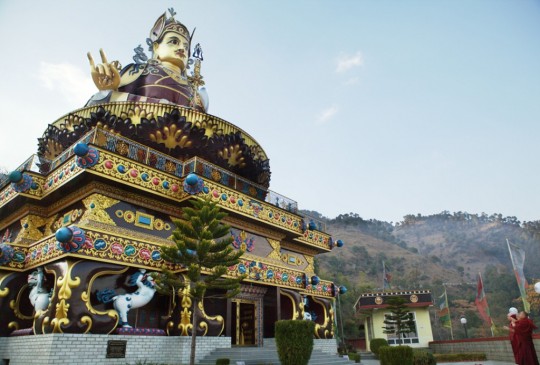
Lama Zopa Rinpoche visited the 110-foot Padmasambhava statue at Tso Pema, Himachal Pradesh, India, January 2016. Photo by Ven. Lobsang Sherab.
Lama Zopa Rinpoche recently spent several weeks at Tso Pema (Lotus Lake, also known as Rewalsar) in the Indian state of Himachal Pradesh. Rinpoche went to Tso Pema to receive rare oral transmissions on vinaya (monastic discipline) from the abbot of Zigar Monastery, a Kagyü monastery in Tso Pema. Rinpoche also spent time doing personal retreat and circumambulating the lake.
Tso Pema is closely associated with the 8th-century Indian Buddhist master Padmasambhava, or Guru Rinpoche. According to the story, Padmasambhava angered the king of the area by teaching Dharma to his daughter. The king had Padmasambhava burned alive in a pyre that created great clouds of smoke. But after several days, a lake appeared in the same spot and Padmasambhava was sitting in the middle of the lake on a lotus and the king came to see the error of his ways.
There are many holy sites in the area, which Rinpoche visited, including the cave where Padmasambhava meditated, Zangdok Palri Palace Monastery, and the 110-foot (34-meter) tall Padmasambhava statue overlooking the lake.
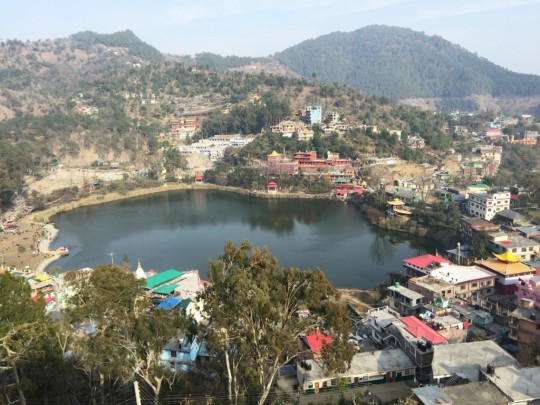
Tso Pema, Himachal Pradesh, India, January 2016. Photo by Ven. Roger Kunsang.
Lama Zopa Rinpoche is the spiritual director of the Foundation for the Preservation of Mahayana Tradition (FPMT), a Tibetan Buddhist organization dedicated to the transmission of the Mahayana Buddhist tradition and values worldwide through teaching, meditation and community service.
- Tagged: lama zopa rinpoche, padmasambhava, tso pema
- 0
12
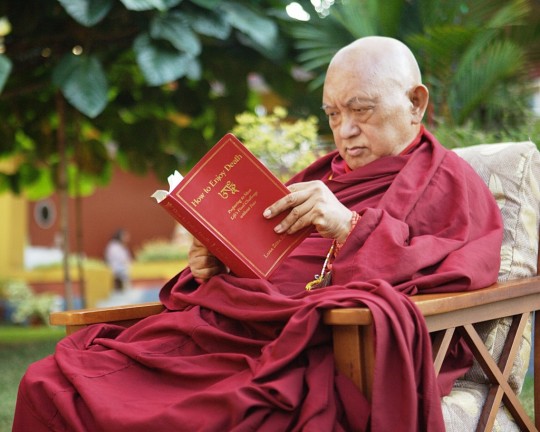
Lama Zopa Rinpoche with a copy of his new book ‘How to Enjoy Death,’ Osel Labrang, Sera Monastery, India, December 2015
Lama Zopa Rinpoche’s much anticipated book How to Enjoy Death: Preparing to Meet Life’s Final Challenge without Fear is now available through the FPMT Foundation Store. The beautifully printed book is a practical guide for students on how to best help loved ones and themselves during the death process.
“We Buddhists all know about death and impermanence, but when death comes into our lives we often panic and don’t know what to do to help,” said Ven. Robina Courtin, who edited the book. “Rinpoche lays out all the instructions so clearly, one step at a time, for how to help our loved ones: what to do in the months and weeks before death, what to do in the hours before death, at the time the breath stops, and in the three days as well as the 49 days after death, including transforming our loved one’s ashes into a holy object.”
In addition to Rinpoche’s advice, How to Enjoy Death includes the mantras, prayers and practices to be said and done, making it a valuable resource.
“The essential point of all these practices is not just to help our loved ones die well, but to help them get a good rebirth – everything is geared to that,” Ven. Robina stressed. “As Rinpoche says, ‘Helping our loved ones at the time of death is the best service we can offer them, our greatest gift. Why? Because death is the most important time of life: it’s at death that the next rebirth is determined.’”
Find links to many resources for time of death on FPMT.org/death.
The FPMT Foundation Store distributes Dharma materials around the world and supports the work of FPMT International Office. All proceeds from this shop are used to further the charitable mission of FPMT, Inc. Visit https://shop.fpmt.org.
Lama Zopa Rinpoche is the spiritual director of the Foundation for the Preservation of Mahayana Tradition (FPMT), a Tibetan Buddhist organization dedicated to the transmission of the Mahayana Buddhist tradition and values worldwide through teaching, meditation and community service.
10
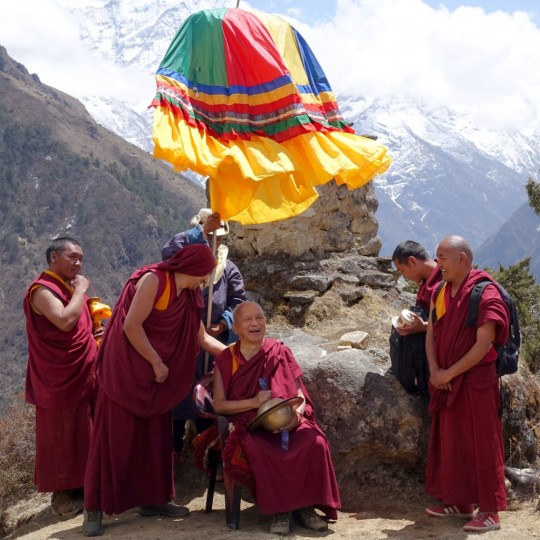
Lama Zopa Rinpoche near Lawudo Retreat Centre, Nepal, April 2015. Photo by Ven. Roger Kunsang.
“Many problems arise when our motivation is the selfish mind, concentrated in our heart,” Lama Zopa Rinpoche teaches in The Power of Compassion, a 2006 Malaysia teaching now available through the Lama Yeshe Wisdom Archive. “The main achievement is our own happiness, not others. When we do that, then there’s carelessness to others, no concern to others. Then those other people who are doing work for us become dissatisfied, they become unhappy. They don’t get treated well, they don’t get respect, then they become unhappy and they leave, or they create trouble for us. The other workers in the company or business create problems, they give harm to us, so things like that.
“Because of our selfish mind, then our actions are unkind and others become unhappy. Then we get problems, trouble. This effect is the consequence of the selfish mind. We receive the problem, but it is originally coming from our selfish mind. It becomes a circle, like that.
“Like this, the problem increases more and more. Then after some time there are court cases and people are suing each other, then you lose all the money and all these things. There are debts and all this, then the problems get built up in the life, like that. So that’s one explanation.
“Even if you become a millionaire or a billionaire, because of the selfish mind, the strong desire wanting more, better things – you want more, you want to be more rich than other wealthy people in the world – there is no ending. You engage in illegal things and many other things, then after some time, other people find out. Then all the people in the company use that to sue you. They become unhappy and sue you back. Your life ends up with a bad reputation in the world, in the newspaper, on TV. Even after you become a millionaire or a billionaire, you end up with a bad reputation and end up with life in prison.
“All these are shortcomings of the ego. This is a reality [recognized by] any religion, it doesn’t matter whichever religion it is. This is reality. Everybody can understand that.”
Find the complete The Power of Compassion on the Lama Yeshe Wisdom Archive:
https://lamayeshe.com/article/power-compassion
Lama Zopa Rinpoche is the spiritual director of the Foundation for the Preservation of Mahayana Tradition (FPMT), a Tibetan Buddhist organization dedicated to the transmission of the Mahayana Buddhist tradition and values worldwide through teaching, meditation and community service.
8
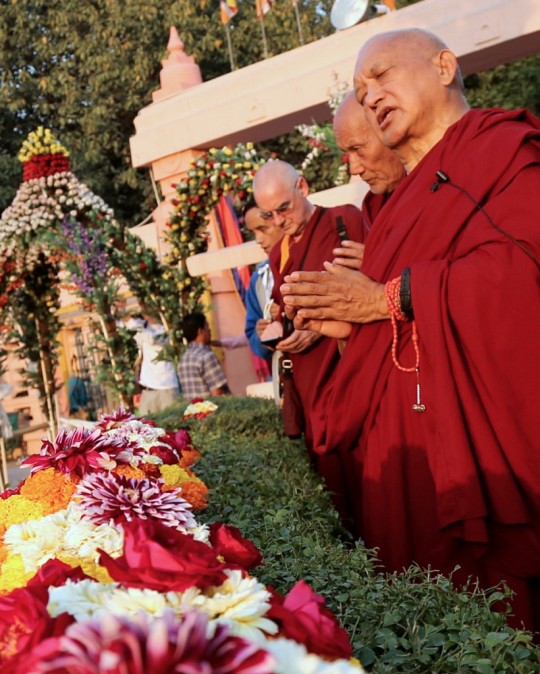
Lama Zopa Rinpoche at the Mahabodhi Stupa in Bodhgaya making offerings, February 2015. Photo by Ven. Thubten Kunsang.
In 2014, while Lama Zopa Rinpoche was celebrating Losar at Root Institute in Bodhgaya, he gave an inspiring teaching during a long life puja being offered to him. Ven. Sarah Thresher shared this report:
“… Following the tsog offering, Rinpoche took the microphone and began teaching. First he explained how important are these 15 days of Losar – the days that commemorate Buddha displaying miracles to subdue the Tirthika teachers – because at this time merit multiplies many 100 millions of times. Rinpoche commented that for ‘lazy’ people like himself, it was an opportunity to make up for all the lost time of the rest of the year when no practice was done.
“Rinpoche then continued with a beautiful talk about the qualities of Lama Yeshe and the importance of the guru. He quoted Padampa Sangye who advised, ‘Cherish the Guru more than the Buddha and realizations will come in this lifetime.’ Rinpoche described some of the obvious qualities of Lama Yeshe – his always-loving aspect that attracted everyone to him, his humility, his wisdom – and explained that Lama was known by all to be a great scholar. Rinpoche then mentioned that Lama Yeshe was also a great yogi who had the tantric realizations of clear light and illusory body but that he hid these profound practices by meditating while lying down during his regular afternoon ‘nap.’ Rinpoche said that whatever benefit the FPMT had been able to offer and however much we ourselves had been able to learn and practice, it was all due to Lama Yeshe’s kindness because it was Lama who set up the organization. …”
For more of Rinpoche’s advice for how to celebrate Losar and the 15 Days of Miracles, see a recent blog post by FPMT Education Services:
https://fpmt.org/edu-news/please-offer-lama-chopa-with-tsog-on-losar-in-honor-of-lama-yeshe/
Lama Zopa Rinpoche is the spiritual director of the Foundation for the Preservation of Mahayana Tradition (FPMT), a Tibetan Buddhist organization dedicated to the transmission of the Mahayana Buddhist tradition and values worldwide through teaching, meditation and community service.
- Tagged: lama zopa rinpoche, losar
- 0
5
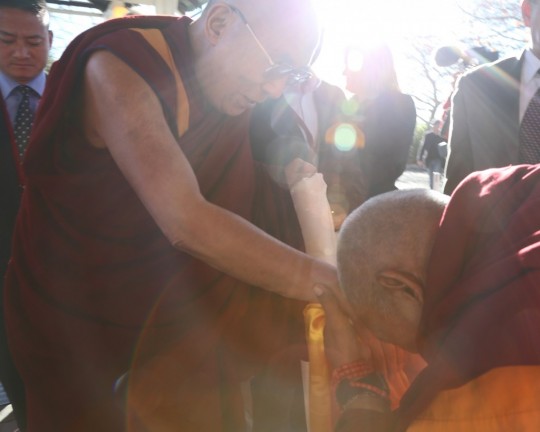
His Holiness the Dalai Lama and Lama Zopa Rinpoche, Blue Mountains, Australia, June 2015. Photo by Ven. Thubten Kunsang.
Lama Zopa Rinpoche has recently said that in order to purify our karma students can do the following practices dedicated for the health and long life of His Holiness the Dalai Lama:
- “Prayer to Guru Rinpoche to Clear Away Obstacles on the Path” (“Barche Lamsel”): the long or the short version
As many people have already been doing and continue to do the long Kshitigarbha mantra to pacify earthquakes, they can also dedicate this practice to His Holiness the Dalai Lama’s long life.
His Holiness is currently resting after receiving treatment at the Mayo Clinic in the United States. He will resume his teaching schedule in March 2016.
On February 4, His Holiness recorded a video message for Losar, Tibetan New Year. His Holiness speaks to Tibetans in Tibet and in exile as well as friends and supporters worldwide from Rochester, Minnesota, US. His Holiness speaks in Tibetan with English subtitles.
More information, photos and updates about FPMT spiritual director Lama Zopa Rinpoche can be found on Rinpoche’s webpage on FPMT.org. If you’d like to receive news of Lama Zopa Rinpoche and FPMT via email, sign up to FPMT News.
3
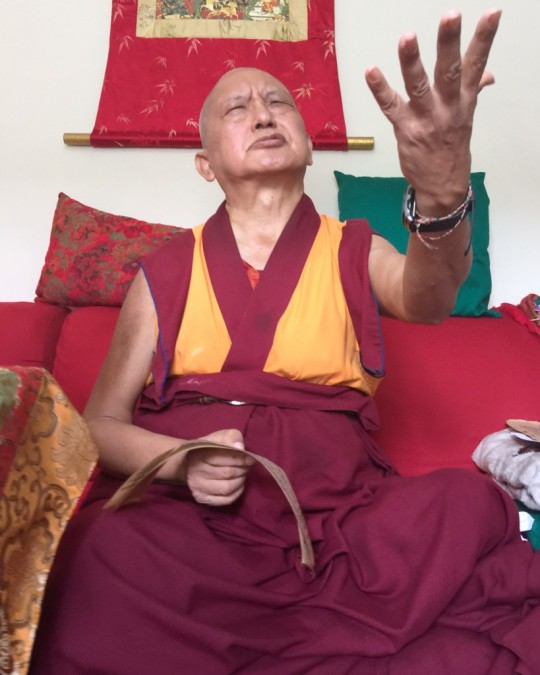
Lama Zopa Rinpoche in Brazil, September 2015. Photo by Ven. Thubten Kunsang.
“The whole life, busy with attachment and anger, is like an elephant caught in a quagmire. It cannot get out, it is completely caught in a quagmire of mud,” Lama Zopa Rinpoche taught in 2013 at Amitabha Buddhist Centre in The Path to Total Freedom, now available through the Lama Yeshe Wisdom Archive. “Life is like that, we are completely caught in the quagmire of attachment and anger, like a hallucination.
“Therefore, if we are really practicing Dharma, we can cut attachment and be totally free. As much Dharma as we practice, the less attachment is possible. Even though problems, worries and fears are not completely cut off, they become much less in our life. Therefore, there is much peace in our heart; there is great peace, because we are living our life in Dharma without attachment. Even when death comes, any time, we die in great peace. We have no worries, nothing.
“Before developing bodhichitta, we have to have preliminary renunciation of samsara. Before renunciation of samsara in the next life, we need renunciation to this life. The mind has to be living in Dharma, otherwise we can’t have bodhichitta. Without renunciation, we can’t have bodhichitta. We can’t jump ahead, thinking, ‘Oh, I don’t have renunciation, but I will jump.’
“Many people do meditation, but they don’t like renunciation. The more we meditate, the more we learn Dharma, the more we see our suffering, samsaric suffering, then it’s so easy to generate compassion for others, who have been suffering since beginningless rebirth just like us. The more we see our own suffering, the easier it is to develop compassion for others. It is so much easier to develop bodhichitta, so much easier to enter the Mahayana path, so much easier to achieve enlightenment for sentient beings, so much easier to enlighten sentient beings.”
Find the complete The Path to Total Freedom on the Lama Yeshe Wisdom Archive:
https://lamayeshe.com/article/path-total-freedom
Lama Zopa Rinpoche is the spiritual director of the Foundation for the Preservation of Mahayana Tradition (FPMT), a Tibetan Buddhist organization dedicated to the transmission of the Mahayana Buddhist tradition and values worldwide through teaching, meditation and community service.
2
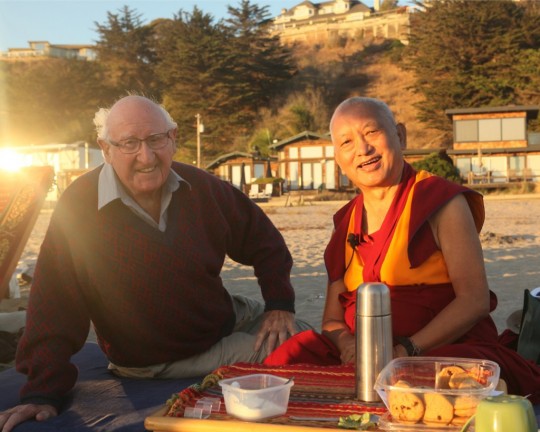
Lama Zopa Rinpoche with Richard, the father of long-time FPMT student Pam Cayton, California, October 2015. Photo by Ven. Roger Kunsang. Rinpoche and students were on the beach to bless all of the beings in the ocean.
“A good parenting plan comes from having a healthy, positive motivation for bringing up your children, one that is based on a good heart rather than on attachment. If you have a good heart and a good attitude toward life, and consequently try to do positive things to help others in your daily life, it will have a strong impact on your children,” Lama Zopa Rinpoche teaches in Joyful Parents, Successful Children, a new publication from Amitabha Buddhist Centre in Singapore, now available through the Lama Yeshe Wisdom Archive.
“It will be of great benefit to them and they will grow up with a healthy mind—a positive, pure Dharma mind. With this type of mind, they won’t harm themselves, nor will they harm other sentient beings: their families, neighbors, fellow countrymen and the people of the world, not to mention animals. Not only that, their healthy minds will also make it possible for them to bring peace and happiness to others.
“Children learn from their parents, so if they see you trying to benefit others, they will receive a positive message from your example. Then, when your children have their own children, they will pass on that same education by also living their lives with a good heart and helping others. Your children will be an example for their own children, that is, for your grandchildren. Like this, parents can help to transmit from generation to generation the importance of a good heart, of not causing harm to others and of doing as many positive actions as possible. If you do this, the result will not only be an enjoyable family life for you and your children, but it will also bring much happiness and peace to the sentient beings of this world, life after life. Therefore, your role as a parent is extremely important and entails a truly big responsibility.”
Find the complete Joyful Parents, Successful Children on the Lama Yeshe Wisdom Archive:
https://lamayeshe.com/article/joyful-parents-successful-children
Lama Zopa Rinpoche is the spiritual director of the Foundation for the Preservation of Mahayana Tradition (FPMT), a Tibetan Buddhist organization dedicated to the transmission of the Mahayana Buddhist tradition and values worldwide through teaching, meditation and community service.
1
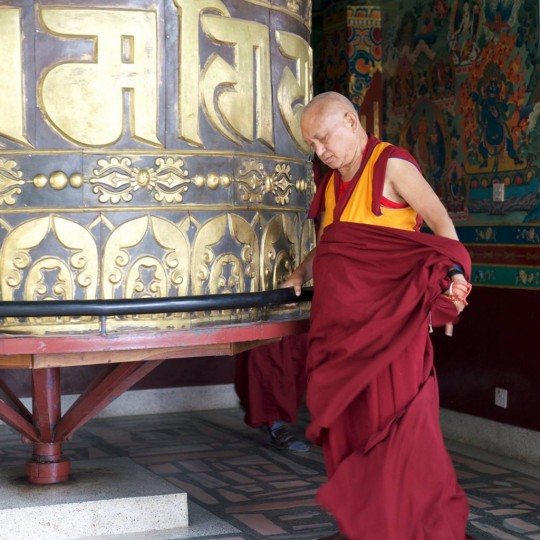
Lama Zopa Rinpoche turning the large prayer wheel at Kopan Monastery, Nepal, November 2015. Photo by Bill Kane.
“Who helps us to develop this incredible, priceless quality within us, this patience, this compassion, this priceless quality within us? Who helps us to develop this, to generate this, and to give peace and happiness to all living beings?” Lama Zopa Rinpoche asks in The Power of Compassion, a 2006 Malaysia teaching now available through the Lama Yeshe Wisdom Archive. “It is this person who has anger toward us, who abuses us, who harms us.
“This person gives us the opportunity and helps us to generate this priceless quality in the mind, thus we can offer all this peace and happiness to numberless other living beings from life to life.
“Therefore this person is so precious, unbelievably precious. There are no words to thank him for that, no words to thank him. He is precious.
“Without talking about the life after this, just in this life we can offer so much peace and happiness with patience and compassion, to our family and the country and whole world. We can bring so much peace and happiness. We can bring that to them. That’s unbelievable. That’s accomplishing our purpose in life. That’s the real meaning of life, it makes the life so worthwhile.
“That’s by the kindness of this person who has anger to us, who harms us. Because of this person’s anger and the action of harming us, this gives us the opportunity to train our mind, to practice patience and compassion. So we’re able to offer so much peace and happiness to the world, to numberless living beings, and we see this as so kind, so precious.
“We can see that even for nonbelievers – without believing in reincarnation or karma or the life after this – we can see the kindness of that person.”
Find the complete The Power of Compassion on the Lama Yeshe Wisdom Archive:
https://lamayeshe.com/article/power-compassion
Lama Zopa Rinpoche is the spiritual director of the Foundation for the Preservation of Mahayana Tradition (FPMT), a Tibetan Buddhist organization dedicated to the transmission of the Mahayana Buddhist tradition and values worldwide through teaching, meditation and community service.
- Home
- News/Media
- Study & Practice
- About FPMT Education Services
- Latest News
- Programs
- New to Buddhism?
- Buddhist Mind Science: Activating Your Potential
- Heart Advice for Death and Dying
- Discovering Buddhism
- Living in the Path
- Exploring Buddhism
- FPMT Basic Program
- FPMT Masters Program
- FPMT In-Depth Meditation Training
- Maitripa College
- Lotsawa Rinchen Zangpo Translator Program
- Universal Education for Compassion & Wisdom
- Online Learning Center
- Prayers & Practice Materials
- Overview of Prayers & Practices
- Full Catalogue of Prayers & Practice Materials
- Explore Popular Topics
- Benefiting Animals
- Chenrezig Resources
- Death & Dying Resources
- Lama Chopa (Guru Puja)
- Lama Zopa Rinpoche: Compendium of Precious Instructions
- Lama Zopa Rinpoche: Life Practice Advice
- Lama Zopa Rinpoche Practice Series
- Lamrim Resources
- Mantras
- Prayer Book Updates
- Purification Practices
- Sutras
- Thought Transformation (Lojong)
- Audio Materials
- Dharma Dates – Tibetan Calendar
- Translation Services
- Publishing Services
- Teachings and Advice
- Find Teachings and Advice
- Lama Zopa Rinpoche Advice Page
- Lama Zopa Rinpoche: Compendium of Precious Instructions
- Lama Zopa Rinpoche Video Teachings
- ༧སྐྱབས་རྗེ་བཟོད་པ་རིན་པོ་ཆེ་མཆོག་ནས་སྩལ་བའི་བཀའ་སློབ་བརྙན་འཕྲིན།
- Podcasts
- Lama Yeshe Wisdom Archive
- Buddhism FAQ
- Dharma for Young People
- Resources on Holy Objects
- Ways to Offer Support
- Centers
- Affiliates Area
- Teachers
- Projects
- Charitable Projects
- Make a Donation
- Applying for Grants
- News about Projects
- Other Projects within FPMT
- Support International Office
- Projects Photo Galleries
- Give Where Most Needed
- FPMT
- Shop
Translate*
*powered by Google TranslateTranslation of pages on fpmt.org is performed by Google Translate, a third party service which FPMT has no control over. The service provides automated computer translations that are only an approximation of the websites' original content. The translations should not be considered exact and only used as a rough guide.Your whole life is controlled by karma, you live within the energy field of karma. Your energy interacts with another energy, then another, and another. That’s how your entire life unfolds. Physically, mentally, it’s all karma.







